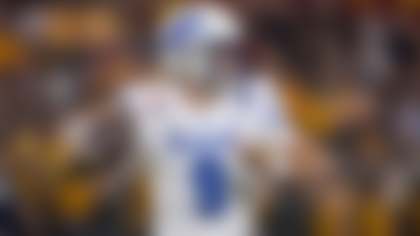GREEN BAY, Wis. -- Kirk Cousins stood behind an elevated lectern after the Vikings' 21-16 loss to the Packers on Sunday at Lambeau Field and made no excuses. He had on slacks, a dress shirt and a perfectly knotted brown tie, but his soul was bare as he discussed throwing an interception that turned potential victory into another big-game defeat.
The situation: After trailing 21-0 in the second quarter, the Vikings rallied to cut the deficit to five midway through the third quarter. Then, after Green Bay and Minnesota punted the ball back and forth over the next five possessions, the Vikes took over at their own 40-yard line with just over 10 minutes to play and ran the ball on seven of eight plays to set up a first-and-goal at the 8. With the go-ahead score in sight, Cousins play-actioned to his left, rolled right and forced a ball to wideout Stefon Diggs despite three defenders being in the vicinity. The result was disastrous, as Packers CB Kevin King jumped in front of Diggs and intercepted the ball in the end zone with 5:10 left in the game.
"It's not going to justify it, but my thought was: Diggsy was running along the back end line -- let me put one out near the back such that it's either his or it goes out of bounds, that kind of deal," Cousins said. "Obviously, the ball was thrown in such a way that the DB was able to make a play and stay inbounds. If you're going to [underthrow] it that way, you can't throw it. That's the kind of stuff you say Day 1. You just can't do that."
Was any consideration given to checking out of the play and running the ball, considering the Vikings had gained 47 of their 52 yards on the ground on that possession?
"Certainly you say that on the sideline afterward, but I shouldn't put our coordinator in that position," Cousins said. "I should throw the ball away and move to the next down."
But this kind of play in that area of the field is nothing new for Cousins. Just check out this nugget courtesy of Pro Football Focus: Since 2017, Cousins ranks 27th out of 27 qualifying QBs in passer rating (76.5) from the opponents' 10-yard line and in. He's completed just 44.6 percent of his passes under these conditions, averaging the lowest yards per attempt (1.6) among qualifying signal-callers.
We are now 18 games into Minnesota's expensive Cousins experiment, which means there is a large enough sample size to question whether the veteran quarterback has given the Vikings reason to believe he's the right guy to lead them to a Super Bowl. The front office and staff believed it to be true last year when they lured him from Washington with a fully guaranteed, three-year, $84 million contract. The insinuation was that he was the missing piece to get Minnesota over the hump after the team had lost in the NFC Championship Game the previous January with journeyman Case Keenum under center.
But Cousins is now 9-8-1 since changing ZIP codes. More concerning: He has not consistently capitalized in big games when plays have been available to him, partially explaining why the Vikings were 1-6 last season against teams that finished with winning records.
The narrative in 2018 was that the line was porous, the running game inconsistent and the play-calling leaned too heavily on the pass. But Sunday affirmed that those were excuses -- not credible explanations -- for justifying a free-agent deal that raised countless eyebrows when it was signed. After all, Cousins was 26-30-1 as a starter in Washington. He lost his only playoff start -- a Wild Card Weekend showdown against Green Bay in January of 2016 -- when he fizzled late after a torrid start, allowing the Packers to notch a 35-18 road win.
The Vikings thought their stingy defense and Zimmer's desire to lean on the run needed only a complementary quarterback who could make a critical play when needed. To date, that has not happened with regularity -- which is not to say Cousins is a bad quarterback. It is to say he's a quarterback who makes just enough plays and puts up enough pretty statistics to entice you into believing there is more to be had, when, in reality, there is not. Sunday marked the 30th career game Cousins has started against a team that carried a winning record into kickoff. The 31-year-old quarterback has only prevailed in just nine of those contests. After the latest setback under these circumstances dropped Minnesota to 1-1, I asked coach Mike Zimmer why he's so confident that Cousins is the quarterback to lead the Vikings to a Super Bowl.
"Well, today he made a couple of mistakes, but the guy made some great throws, as well -- the throw to Diggs (for a 45-yard score)," he said. "So he's got all the talent -- we just need to continue to coach him the way that we want him to play."
The irony is Cousins is most effective when the Vikingslimit his dropbacks. He attempted just 10 passes in a season-opening win over the Falcons. And last year, after coordinator John DeFilippo was fired following a Week 14 loss at Seattle on "Monday Night Football," Cousins threw six touchdown passes against only one interception while averaging just 27 attempts over the final three games.
There's no question the Vikings are at their best when the offense runs through third-year back Dalvin Cook, who rushed for 154 yards and a touchdown on 20 carries Sunday, marking the first time in his career he has logged back-to-back 20-carry games. (Cook racked up 111 yards and two touchdowns on 21 totes in the opener.)
But at some point, Cousins will have to make a play to win a crucial game. And to this juncture, he has given no reason to believe he is up for the challenge.
Follow Jim Trotter on Twitter at _@JimTrotterNFL_












